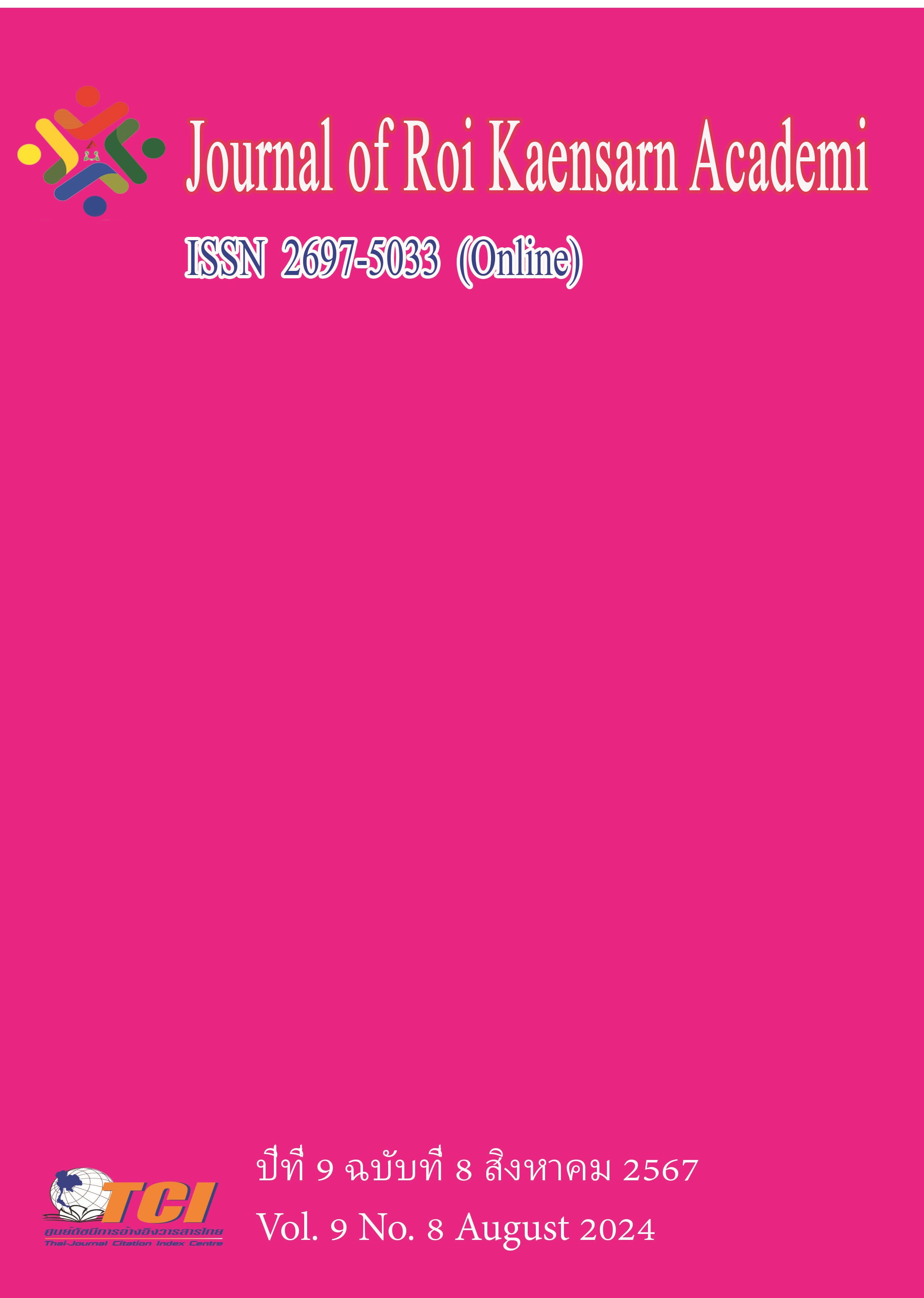The development of Blended Teaching Model Based on Metacognition Theory to Improve College Students' Autonomous Learning Ability
Main Article Content
บทคัดย่อ
The purposes of the study were 1) to investigate the current situation of students’ autonomous learning, 2) to development a blended teaching model based on metacognitive theory to improve students' autonomous learning ability, 3) to compare the effectiveness of the blended teaching model based on metacognitive theory to improve students' autonomous learning ability before and after the implementation. The sample group for the survey on the current status of college students' autonomous learning ability was 400 students majoring in music from Neijiang Normal University, and for the teaching model implementation was 30 freshmen majoring in music from Neijiang Normal University, both adopted the principle of convenience sampling. Research instruments include autonomous learning ability scale, learning self-assessment scale, blended teaching model based on metacognitive theory and lesson plan . The data analysis and research in this study used statistical methods such as mean, standard deviation, percentage ,and dependent sample t-test.
The research results showed that the autonomous learning ability of college students majoring in music at Neijiang Normal University was at a moderate level. The "OKCPC" teaching model combined metacognitive theory with blended teaching included 5 steps: Objective setting, Knowledge acquisition, Cognitive monitoring, Personalized learning ,Cognitive assessment. By implementing the "OKCPC" blended teaching model in vocal basics and song singing courses, the students' autonomous learning ability in posttest was higher than pretest with the statistic significant at .01 level.
Article Details
เอกสารอ้างอิง
Bosch, C., & Laubscher, D. J. (2022). Promoting self-directed learning as learning presence through cooperative blended learning. International Journal of Learning, Teaching and Educational Research, (09), 17-34.
Chen,Y.Q. (2016). Thoughts on several issues concerning autonomous learning in primary and secondary school students. Educational Science Research, (10), 56-60. doi:CNKI:SUN:JYKY.0.2016-10-014.
Feng,X.Y.et al. (2019). Blended learning in the era of "Internet+": Learning theories and pedagogical foundations. China Distance Education, (07), 19-26, 92-93. doi:10.13541/j.cnki.chinade.2019-07-004.
Feng, X. Y., Cao, J. T., & Huang, L. Y. (2020). Methods and strategies for blended learning design in the "Internet+" era. China Distance Education, (08), 25-32+ 54+77. doi:10.13541/j.cnki.chinade.2020.08.004.
He, J. S. (2009). The connotation, composition, and dynamic analysis of students' autonomous learning ability. Educational Review, (02),81-83. doi:CNKI:SUN:JYPL.0.2009-02-027.
He,K.K.(2014). How to implement" depth fusion" of information technology and education. Curriculum. Teaching. Materialand. Method, (02), 58-62+67. doi:10.19877 /j.cnki.kcjcjf.2014.02.012.
Intarasompun,W.,Muangnual,P.,and Punchatree, N. (2022). Active Learning Management and Using E-Portfolio as Authentic Assessment for Teacher Students. Journal of Yanasangvorn Research Institute Mahamakut Buddhist University, 13 (2),108–118. Retrieved from https://so04.tci-thaijo.org/index.php/yri/article/view/262856
Li,D.,&Wang,Y. (2021). Assessment and analysis of college students' extracurricular self-directed learning abilities: A case study of Beihang University. Journal of Beihang University (Social Sciences Edition), (05), 111-117.
Li, S. P., Zhao, W., Liu, H. X., Liu, D. L., & Liu, F. J. (2017). Data representation metacognition: A study on online self-directed learning behavior based on learning analytics. E-Learning Research, (03), 41-47. https://doi.org/10.13811/ j.cnki.eer.2017.03.007
Liu,L.et al. (2020). Analysis of the current status of college students' self-directed learning ability: A case study of an industry-based university. China Educational Technology Equipment, (16), 22-25. doi:CNKI:SUN:ZJJB.0.2020-16-008.
Liu, Y. P., & Fang, L. (2023). A study on the relationship between self-monitoring ability in higher mathematics and academic performance in mathematics: A case study of Tonghua Normal University. Journal of Tonghua Normal University, (12), 138-144. https://doi.org/10.13877/j.cnki.cn22-1284.2023.12.023
Meng,C., Intarasompun,W.,Watananimitgul ,W., & Iamsa-ard, A. (2023). The Development of Issue-centered Teaching Model based on Radical Constructivism Theory to Improve Students’ Critical Thinking Ability. Journal of Roi Kaensarn Academi, 8 (11), 156–170. Retrieved from https://so02.tci-thaijo.org/index.php/JRKSA/article/view/266117
Moshman, D. (2018). Metacognitive theories revisited. Educational Psychology Review, (30), 599-606.
Nguyen, T. (2020). Research on O2O teaching model of Chinese as a foreign language (TCFL) for improving autonomous learning ability [Doctoral dissertation, East China Normal University]. China National Knowledge Infrastructure. doi:10.27149/ d.cnki.ghdsu.2020.001964.
Orzechowska, P., & Polok, K. (2019). Goal-setting as a motivational factor helping FL learners in gaining their levels of FL proficiency. Open Access Library Journal, 6 (3), 1-11.
Pang,W.G.(2003). Autonomous learning: Principles and strategies for learning and teaching. Shanghai, China: East China Normal University Press.
Peihao, X., Intarasompun, W., Watananimitgul , W., & Iamsa-ard, A. (2023). The Development of Life Values Integrated Curriculum to Enhance Mental Health for Freshmen Students. Journal of Roi Kaensarn Academi, 8 (11), 131–146. Retrieved from https://so02.tci-thaijo.org/index.php/JRKSA/article/view/266122
Wang, H. J., Lu, X. Y., Ma, G. Q., & Liao, X. L. (2023). Research on the Effect of Metacognitive Ability on Online Learning Behaviors. Digital Education, (05), 22-29. https://doi.org/CNKI:SUN:SEJY.0.2023-05-004
Wang, L., & Guo, D. J. (2000). The nature and elements of metacognition. Acta Psychologica Sinica, 32 (04), 458-463. doi:CNKI:SUN:XLXB.0.2000-04-015.
Xu, C., Wang, X., Sheng, W., & Mou, Y. (2021). Analysis of the current status of online self-directed learning among college students and strategies for cultivating self-directed learning abilities. Journal of Suzhou University, 2021(11), 66-70. https://doi.org/CNKI:SUN:SZSY.0.2021-11-015.
Zhang,S.H. (2014). Vocal pedagogy in higher education guided by metacognitive theory. Music Composition, (11), 186-188. doi:CNKI:SUN:YYCZ.0.2014-11-048.
Zhonghua, G.., Intarasompun, W.., Watananimitgul , W., & Iamsa-ard, A. (2023). The Development of Blended Teaching model Based on Deep Learning Theory to Enhance college students’ critical thinking. Journal of Roi Kaensarn Academi, 8 (11), 381–394.
Retrieved from https://so02.tci-thaijo.org/index.php/JRKSA/article/view/266121
Zimin , Z., Watannanimtgul , W. ., Intarasompun , W. ., & Iamsa-ard , A. . (2023). The Development of Instructional Model According to Immersive Learning in Virtual Reality Environment to Enhance Tour Guide Students’ Oral Communication Ability . Journal of Roi Kaensarn Academi, 8 (12), 324–338. Retrieved from https://so02.tci-thaijo.org/index.php/JRKSA/article/view/266491

